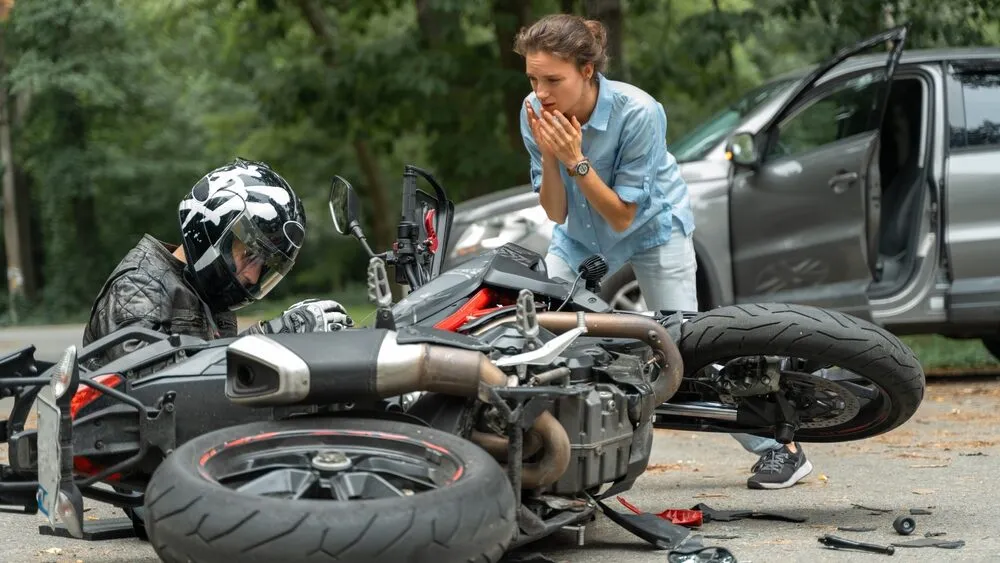Motorcycle accidents can be devastating, and unfortunately, motorcyclists are often more vulnerable to serious injuries than other drivers on the road. If you’ve been involved in a motorcycle accident, it’s important to know your legal rights to ensure you receive the compensation you deserve for your injuries, damages, and suffering. Understanding your rights as a motorcyclist after an accident can help you navigate the complex legal process and protect your interests.
In this blog, we’ll explain the rights you have as a motorcyclist after an accident, from seeking medical care to pursuing a claim and everything in between. Let’s dive into the key legal rights and steps you should take if you find yourself in this unfortunate situation.
1. Your Right to Medical Care
After a motorcycle accident, your health and safety should be your first priority. Whether you’re injured or not, it’s critical to seek medical attention immediately. Even if you don’t feel injured at the moment, some injuries—like concussions, whiplash, or internal injuries—may not show symptoms immediately.
Why It’s Important:
-
Medical Documentation: Receiving timely medical care creates a record of your injuries, which is crucial for any insurance claims or legal action that may follow.
-
Avoiding Complications: Early medical intervention helps prevent complications that may worsen your condition over time, ensuring the best chance for recovery.
Make sure to keep a detailed record of all medical visits, treatments, and diagnoses. This will be essential in proving the extent of your injuries and connecting them to the accident.
2. Your Right to File a Police Report
If you are involved in a motorcycle accident, it’s important to file a police report if the situation warrants it. This includes accidents involving significant property damage, injuries, or where fault is in dispute. A police officer will document the details of the accident, including where and how it occurred, the parties involved, and the initial determination of fault.
Why It’s Important:
-
Official Documentation: The police report is an official record of the accident and can serve as vital evidence in your case.
-
Determining Fault: The police may also provide an initial assessment of who was at fault, which can help shape your claim. This is especially important if you are pursuing compensation from another driver’s insurance company.
Make sure to request a copy of the police report for your records. This will help ensure that the details of the incident are properly documented.
3. Your Right to Compensation for Medical Expenses
If you’ve been injured in a motorcycle accident, you have the right to seek compensation for your medical expenses. Whether you’re dealing with hospital bills, surgeries, doctor visits, rehabilitation, or long-term care, the at-fault party’s insurance company may be liable for covering your medical costs.
Why It’s Important:
-
Full Medical Coverage: You have the right to be compensated for all the medical expenses incurred as a result of the accident, including both current and future medical care.
-
Medical Liens: If you’re unable to pay for medical treatments upfront, your lawyer can help you secure medical liens that allow you to get the care you need without the burden of upfront costs.
Work closely with your attorney to ensure all your medical costs are covered and to help you obtain the compensation necessary to cover long-term care if needed.
4. Your Right to Compensation for Lost Wages
A motorcycle accident can leave you unable to work for a period of time, especially if your injuries are severe. If you can’t work, you have the right to seek compensation for lost wages, both current and future, due to your injuries. This is an important part of your claim if you rely on your income to support yourself or your family.
Why It’s Important:
-
Lost Earning Potential: If your injuries result in long-term or permanent disability that affects your ability to work, you may be entitled to compensation for the income you would have earned over your lifetime.
-
Current Wages: In addition to future lost income, you should be compensated for the time you missed from work due to medical treatment, recovery, or physical therapy.
Your attorney can help gather proof of your lost wages, including pay stubs, tax returns, and doctor’s notes detailing your recovery time.
5. Your Right to Pain and Suffering Compensation
In addition to compensation for medical expenses and lost wages, you have the right to seek compensation for the pain and suffering caused by the accident. This non-economic damage can be difficult to quantify, but it is no less significant than your physical injuries. Pain and suffering compensation takes into account the emotional and psychological impact of the accident on your life.
What Pain and Suffering Covers:
-
Physical Pain: Compensation for the physical discomfort and pain caused by your injuries.
-
Emotional Distress: If you’ve suffered anxiety, depression, PTSD, or loss of enjoyment of life due to your injuries, these emotional impacts can be factored into your claim.
-
Permanent Disability: If your injuries result in long-term or permanent disability, your pain and suffering compensation may be higher due to the lasting impact on your life.
A personal injury lawyer will work with you to calculate the pain and suffering damages and provide supporting evidence for the emotional and psychological toll of the accident.
6. Your Right to Pursue a Personal Injury Lawsuit
If the insurance company offers an unfair settlement or denies your claim, you have the right to file a personal injury lawsuit. In many cases, motorcyclists are offered low settlements or have their claims denied because insurance companies try to minimize their payouts. If a settlement cannot be reached, a lawsuit may be necessary to ensure that you get the compensation you deserve.
Why a Lawsuit May Be Necessary:
-
Unfair Insurance Offers: Insurance companies may try to offer a quick settlement that doesn’t cover the full extent of your damages.
-
Fault Disputes: If there is a disagreement over who was at fault for the accident, a lawsuit can help clarify the situation in court and ensure that you’re fairly compensated.
-
Permanent Injuries: If your injuries are permanent, a lawsuit can help ensure that you receive compensation for long-term medical care and lost future wages.
A motorcycle accident lawyer will guide you through the litigation process, ensuring that all your legal options are explored and that your rights are protected.
7. Your Right to Fair Compensation for Property Damage
If your motorcycle or personal property was damaged in the accident, you have the right to seek compensation for repairs or replacement. This is often covered by the at-fault party’s insurance policy.
Why It’s Important:
-
Vehicle Repair or Replacement: Motorcycle accidents can cause extensive damage to your bike, leaving you without transportation. Compensation for property damage can help you repair or replace your motorcycle.
-
Personal Property: If your personal property, such as a phone, clothing, or other items, was damaged in the accident, you may be entitled to compensation for those items as well.
Your attorney can help ensure that all property damage is accurately valued and that you receive compensation for your loss.
8. Your Right to Be Protected from Retaliation
If you were involved in a motorcycle accident and are pursuing a claim, you are protected from retaliation by the at-fault party or their insurance company. If you face threats, intimidation, or unfair treatment during the process, there are legal protections in place to ensure that you are not coerced or punished for seeking justice.
Why It’s Important:
-
Legal Protection: You should never feel threatened or pressured during the legal process. If you experience retaliation, your lawyer can take immediate action to protect your rights.
9. What to Do If You’re in a Motorcycle Accident
If you’ve been involved in a motorcycle accident, here are the steps to take to protect your rights:
-
Seek medical care immediately.
-
Call the police and file an accident report.
-
Document everything: take photos, gather witness statements, and get the other driver’s information.
-
Contact a motorcycle accident lawyer: they will guide you through the legal process, handle negotiations with insurance companies, and represent you in court if necessary.
Conclusion
As a motorcyclist, you have legal rights after an accident, and it’s essential to understand these rights to ensure you receive the compensation you deserve. From seeking medical care and filing police reports to pursuing personal injury claims and lawsuits, there are critical steps to take after an accident. Working with an experienced motorcycle accident lawyer will help protect your rights, maximize your compensation, and navigate the complex legal process.


